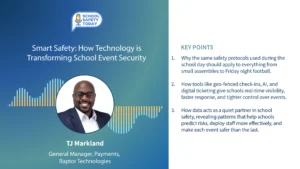4 Key Lessons in EdTech Data and Analytics
In today’s higher education landscape, the collection, appreciation, and usage of data and analytics is not only necessary, it is essential. As our industry continues to adapt and change to new realities, this is even more true, as many institutions are facing new and recurring circumstances around enrollment management, student success, completion, infrastructure, and finance. These pressing priorities swirl into daily pain points that often collide with one another.
To tame the chaos, it is critical to use data to gain information needed for strategic decision-making and meaningful change. To do so, campuses must understand, utilize, and educate their communities on the use and integration of data and analytics for the greatest impact.
Over the past two years, UNCF and Anthology have partnered to assist a cohort of HBCUs in strengthening their institutional data processes. One of the most impactful methods deployed by UNCF and Anthology is a data and analytics credential program. Here are four key lessons we have learned from our work with HBCUs that can be applied to all institutions.
1. Data governance structures are a necessity.
In order to effectively use data on campus, you need a plan. However, before that conversation can begin, processes and methods for managing institutional data must be established. To propel your campus forward, data governance should be used as a launching pad to build strong systems around data infrastructure, data stewardship, and data fluency. Institutions should create a fluent, cross-functional approach to identify what data exists, what data needs to exist, how data will exist, and who will be responsible for its existence.
2. Continuous improvement practices must become a cultural norm.
We know that most campuses struggle with the balance between internal improvement and external accountability. Tensions surrounding institutional processes often drive campus leaders to focus only on compliance. Therefore, the cultural norm is centered on completion—or checking the box. Instead of viewing things through the lens of compliance, why not transform efforts into a roadmap for continual progress based on mission development and data-informed practices? Often, such actions would require a shift in mindset for the entire campus community as well as changing the campus’ relationship with data. This shift will support faculty and staff to think more critically about data, make use of purposeful analytics and play an integral part in strategic planning for the institution. And if campuses continuously pursue internal improvement processes, they can then by default demonstrate compliance with external accountability measures.
3. Opportunities to learn are highly desired by all.
Many HBCUs are utilizing the data and analytics credential series as a form of professional development. Those who work in institutional research and institutional effectiveness offices are taking advantage of the program, as expected. However, we have also seen increased interest from faculty, program coordinators, senior administrators, graduate students, and other staff members within an institution. This is encouraging, as it shows a wide range of individuals are seeking ways to strengthen their knowledgebase and campus data operations—a desire that we see echoed by professionals at campuses of all stripes.
4. The small pipeline of experienced institutional research and effectiveness professionals is detrimental.
Unlike some larger, more-resourced institutions, many smaller colleges and universities have one or two individuals performing institutional effectiveness, research, assessment, and planning functions for the entire campus. Unfortunately, if one of those individuals were to leave, so would the practices and the institution’s knowledge of how and where data is stored. Hiring skilled replacements can take months and even years for some institutions due to limited resources and competitive salaries. Therefore, institutions must take action to develop structures, policies and practices so that no matter who comes and goes within the IR or IE office, the institution’s method for data operation is still in place.
All in all, what can all institutions do to build recognition of the need for these lessons learned from our HBCU credential cohort? It is vital for trustees, presidents, and senior administrators to evaluate, create, and align their people, processes, and technology. To do so, institutions should create an organizational culture of data and analytics at all levels; ensure data-informed responsibilities are intimately tied to mission-critical roles; and evaluate their systems to ensure the right technologies are in place to assist skilled employees with the collection, management, analysis and dissemination of data. With these concepts in place, all institutions can both operate efficiently and educate effectively.
–
Twitter – @MarketScale
Facebook – facebook.com/marketscale
LinkedIn – linkedin.com/company/marketscale







